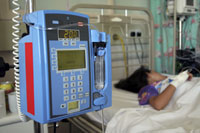
What is physical trauma?
Physical trauma is a serious injury to the body.
- Blunt force trauma occurs when the body is struck with an object or force, causing concussions, lacerations, or fractures.
- Penetrating trauma occurs when an object pierces the skin or body, usually creating an open wound.
- Trauma also results from “controlled injury,” such as that caused by surgery.

What is psychological trauma?
Psychological trauma is an emotional or psychological injury, usually resulting from an extremely stressful or life-threatening situation. For more information on psychological trauma, visit the National Institute on Mental Health’s Coping with Traumatic Events.
How many people die from physical trauma each year in the United States?
According to the Centers for Disease Control and Prevention (CDC), unintentional injury kills more people between the ages of 1 and 44 than any other disease or illness. Trauma (including accidental and deliberate injuries) causes:

• 35 percent of all deaths from ages 1-4
• 38 percent of all deaths from ages 5-9
• 74 percent of all deaths from ages 10-24*
• 56 percent of all deaths from ages 25-34*
• 31 percent of all deaths from ages 35-44*
* includes suicides and homicides
What is shock?
Shock often accompanies trauma. Also known as “circulatory collapse,” shock can occur when the blood pressure in a person’s arteries is too low to maintain an adequate supply of blood to organs and tissues.
What are the symptoms of shock?
The symptoms of shock include cold and sweaty skin, weak but rapid pulse, irregular breathing, dry mouth, dilated pupils, and reduced urine flow.
What causes shock?
Shock can be caused by internal or external bleeding (hypovolemic shock), dehydration, burns, or severe vomiting and/or diarrhea. All of these involve the loss of large amounts of body fluids.

What are the different types of shock?
- Septic shock is caused by microorganisms in the bloodstream.
- Anaphylactic shock is caused by a severe allergic reaction.
- Cardiogenic shock is caused by the inability of the heart to pump blood effectively.
- Neurogenic shock is caused by extreme emotional upset due to personal tragedy or disaster.
Where can I find more information and statistics about trauma and shock?
Content created July 2008
